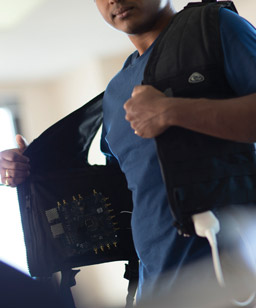byte
Vest Helps Detect Cancer Before Symptoms Arise

The most advanced technology in the world is of little use to patients who can’t access it.
This maxim moved Case Western Reserve engineering researchers to pursue a cancer screening option that is less than perfect— but more than adequate to catch many of the most common forms of the disease before symptoms arise.
Doctoral candidates Abhishek Basak and Vaishnavi Ranganathan and their adviser, Swarup Bhunia, PhD, associate professor of electrical engineering, placed ultrasound sensors and other technology into an affordable, compact fabric vest. Embedded software automatically detects anomalies in organ tissues and alerts the wearer.
The team found that ultrasound technology, which can be easily miniaturized, could detect cancers early in organs close to the skin, such as breast, ovary, uterus, bladder and prostate—where about half the cancers were diagnosed in women and 42 percent in men last year.
For much of the world’s population, the vest is a better diagnostic tool than magnetic resonance imaging (MRI), computed tomography (CT) or positron emission tomography (PET) scanners, “primarily because of its point-of-care usage advantages: convenience, portability and accessibility,” Basak says.
Bhunia adds, “The cost, which will be a small fraction of the scanners, is particularly attractive for developing countries.”
The researchers plan to begin testing a prototype by year’s end.
